GET CRITIQUE PARTNERS
I just finished my first novel! The feeling is indescribable. Do you have any advice on editing, big or small?
Dear fate-and-chance,
Congratulations on joining THE ENDTIMES CLUB.
Editing is basically the place the novels become novels — it’s impossible to overstate how the rough draft is only 10% of the process. Here is a pie chart demonstrating the overall gist. It’s messed up because I aggressively and deliberately misunderstand math at all times and also because I traced a ramekin full of discarded date pits on my desk for the outside, but you get the idea.

What I’m trying to say is: be prepared to spend the same amount of time editing as writing.
GET CRITIQUE PARTNERS
This is the first step to editing. You need outside eyes. You don’t know if you have written the story you intended to tell until readers tell you that you’ve succeeded. A story is not complete until it has an audience.
You can find some here.
BIG PICTURE EDITS
It’s important to do your edits in the right order: there’s no point focusing on word choice when you don’t know if you’re going to keep a scene or not. What you’re looking for in big picture edits are
• pacing (is it taking you forever to get to your inciting incident? Are you leaping into breathless action so fast that the reader doesn’t have time to get emotionally invested? Is the general shape correct — do your stakes both emotional and physical slowly ratchet up til the climax?)
• clarity (do we know what the point of the book is? Do we understand who the main character is? Do we understand the stakes of the magic or the mystery or love story, etc?)
• momentum (are your scenes stacked in the correct order, or do you move backwards in stakes or have two scenes that essentially do the same thing?)
• consistency of character (are your characters consistent and inevitable? can we predict their behavior enough to be shocked if they do something out of character for once?)
• correctness of cast (do you have two characters who do the same thing in the plot? do you need to delete or add POVs or characters to your cast?)
• simplicity of execution (does the reader understand where they are in the plot? can they guess they are halfway through when they are halfway through, etc.?)
Title a document “outtakes.doc” and throw stuff that’s not working into it. You can always come back to them if you need them, but it’s often easier to see what you’re doing with the chaff removed.
LINE EDITS
Line edits are when you stop having to move big chunks around and can start fixing things within your newly edited shape. That is when you can start looking at adjusting pacing, tone, and momentum on a line level. Example:
Original sentence: The box rolled out of the truck and hit the ground.
Speed things up: Wham. The box, dropped. Tssss. Glass, exploded.
Slow things down: She snatched at air, and felt the whisper of the box sliding against her fingertips. The sound of the bottles exploding on the pavement echoed down the alley.
Ground us: Everything changed the moment that box hit the asphalt.
Tell us about a character: Ten years before, she’d been watching a box fall from through her mother’s hands in just this way. MORE ANECDOTE HERE
COPYEDITS
This is the part where you actually fix typos and continuity errors, and it’s the least important part of editing. This is where you can enlist a non-bookish friend to feel useful, because the less invested you are in the book, the easier they are to spot.
IN CONCLUSION
You could write entire books about revision — someone probably has — but this might be a start.
Happy wording.
urs,
Stiefvater
More Posts from Thedevilpriv-blog and Others
Todo esto es una mierda, estoy enamorada de la idea del amor, mi cerebro solamente se siente bien si cree en el enamoramiento o esos sentimientos que se supone debemos de tener por otras personas. Pero él me tiene aquí escribiendo, ansiosa… Triste… Y necesitada de su jodida atención.
(via poetamundo)
Amor ¿Cómo no atarme a tu universo? ¿Cómo no perder la razón por tus besos? ¿Cómo no caer ante ti?, si en ti encuentro todo, no me falta nada, mi mirada te dice: “estoy jodidamente enamorado”; te amo “hasta la madre”, tú eres mi universo y yo tan solo un planeta. Eres el amor de mi pinche vida.
“And we laugh like soft mad children, mug in the woolly cotton brains of infancy ...”
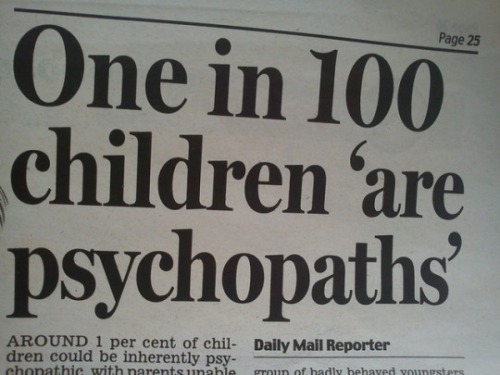
«¿Por qué estás tan pálida hoy?»
—Porque muy amarga fue la tristeza
que bebió sin medida de mis manos.
Me diste razones para dejar de amarte, pero ¿Cómo hacerlo? Tu eres mi definición del amor.
Otra vida etérea
“Al hombre que aún soy le gusta la mujer que tú eres…”
— José Saramago
ay Dio mio
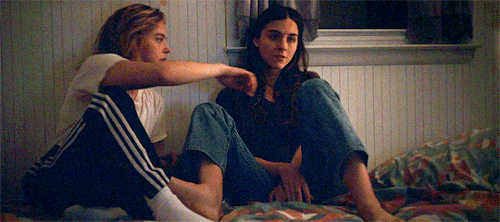
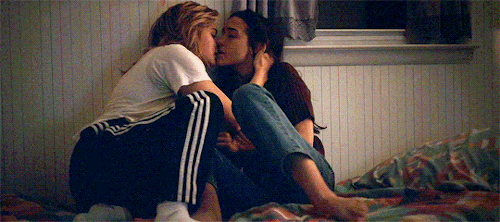
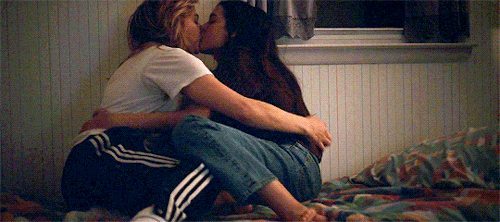
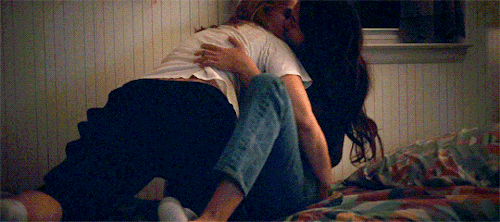
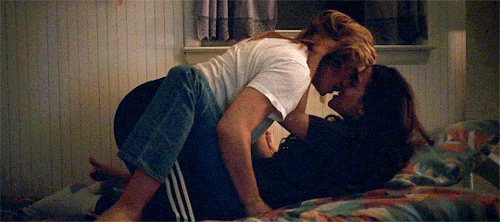
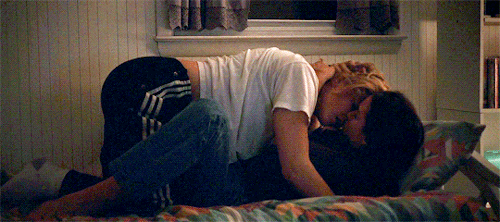
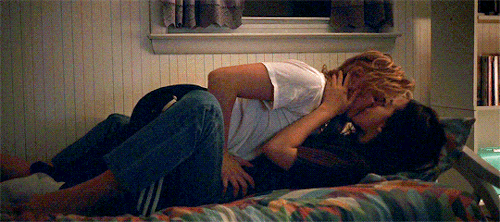
The Miseducation of Cameron Post (2018)
Hubo un chico, que no sabía casi nada de ninguna cosa, pero intentaba entender la filosofía, practicaba música, hacía bocetos, sacaba fotos extrañas, trataba de aprender otro idioma, observaba la naturaleza, quería escalar montañas y un día tomar su mochila e irse muy lejos y un pendejo le dijo “Tú quieres hacer de todo o qué te crees” y el chico le dijo “Claro que quiero hacer de todo, quiero escribir poesía, quiero componer canciones que hagan historias de amor y armen de nuevo corazones, quiero pintar sintiendo mi pulso y la paciencia del cielo, quiero retomar el asombro por la luna y sentir al menos un poco de lo que tanto observaban Newton, Galileo o los mayas, también quiero viajar, con mis pies, o en coche porque la única manera de viajar hace mil años era en caravanas de comerciantes a un paso de treinta kilómetros por hora y ahora puedo ir más lejos, de hecho ahora podemos ir más lejos, pero nos hemos puesto límites muy pendejos, y quiero hablar otras lenguas para ejercitar mi cerebro para entender el origen de otras cosas que desconozco, y quiero saber de física, química, medicina, literatura, historia del arte, ingeniería, genética, artes marciales, sobre las semillas porque desde hace miles de años los humanos se alimentan del trigo, la cebada, el arroz, frijol, avena y maíz ¿qué me creo? Me creo humano, naturaleza curiosa, instintiva razón y corazón entusiasta, mi cerebro no evolucionó miles de años para quedarme sentado como tú viendo cómo pasa el mundo a través de una pantalla.
El libro tinto para charlar con el que no vino, Quetzal Noah (via quetzalnoah)
-
 purple-parker reblogged this · 10 months ago
purple-parker reblogged this · 10 months ago -
 precisely-parker liked this · 10 months ago
precisely-parker liked this · 10 months ago -
 rockygetsrolling liked this · 1 year ago
rockygetsrolling liked this · 1 year ago -
 1591c liked this · 1 year ago
1591c liked this · 1 year ago -
 25centsoda reblogged this · 2 years ago
25centsoda reblogged this · 2 years ago -
 luvqwish reblogged this · 2 years ago
luvqwish reblogged this · 2 years ago -
 jellbert14 liked this · 2 years ago
jellbert14 liked this · 2 years ago -
 mars-scribbles liked this · 2 years ago
mars-scribbles liked this · 2 years ago -
 mars-scribbles reblogged this · 2 years ago
mars-scribbles reblogged this · 2 years ago -
 alex-immortal reblogged this · 3 years ago
alex-immortal reblogged this · 3 years ago -
 famousinthewriteway reblogged this · 3 years ago
famousinthewriteway reblogged this · 3 years ago -
 buffylesbian-archive reblogged this · 3 years ago
buffylesbian-archive reblogged this · 3 years ago -
 buffylesbian-archive reblogged this · 3 years ago
buffylesbian-archive reblogged this · 3 years ago -
 jadebee reblogged this · 3 years ago
jadebee reblogged this · 3 years ago -
 things-saved-for-later-blog reblogged this · 3 years ago
things-saved-for-later-blog reblogged this · 3 years ago -
 onedragontorulethemall liked this · 4 years ago
onedragontorulethemall liked this · 4 years ago -
 eisenpeach reblogged this · 4 years ago
eisenpeach reblogged this · 4 years ago -
 kittywitchy1 liked this · 4 years ago
kittywitchy1 liked this · 4 years ago -
 persephonejinmi liked this · 4 years ago
persephonejinmi liked this · 4 years ago -
 plotandsketch reblogged this · 4 years ago
plotandsketch reblogged this · 4 years ago -
 barda-free liked this · 4 years ago
barda-free liked this · 4 years ago -
 combilicious reblogged this · 4 years ago
combilicious reblogged this · 4 years ago -
 enjambedlife reblogged this · 4 years ago
enjambedlife reblogged this · 4 years ago -
 theycallme-misterpig liked this · 4 years ago
theycallme-misterpig liked this · 4 years ago -
 starieldreamer reblogged this · 5 years ago
starieldreamer reblogged this · 5 years ago -
 too-short-for-my-own-good liked this · 5 years ago
too-short-for-my-own-good liked this · 5 years ago -
 victorianaraye reblogged this · 5 years ago
victorianaraye reblogged this · 5 years ago -
 cuits liked this · 5 years ago
cuits liked this · 5 years ago -
 hurricanekelleigh liked this · 5 years ago
hurricanekelleigh liked this · 5 years ago -
 fangasmic liked this · 5 years ago
fangasmic liked this · 5 years ago -
 shrewreadings liked this · 5 years ago
shrewreadings liked this · 5 years ago -
 icoulddthisallday reblogged this · 5 years ago
icoulddthisallday reblogged this · 5 years ago -
 thinkoutsidethesnogbox reblogged this · 5 years ago
thinkoutsidethesnogbox reblogged this · 5 years ago -
 thinkoutsidethesnogbox liked this · 5 years ago
thinkoutsidethesnogbox liked this · 5 years ago -
 fuckyoupbk reblogged this · 5 years ago
fuckyoupbk reblogged this · 5 years ago -
 justablipintheuniverse reblogged this · 5 years ago
justablipintheuniverse reblogged this · 5 years ago -
 heijihatsutori reblogged this · 5 years ago
heijihatsutori reblogged this · 5 years ago -
 remaketheplaylist reblogged this · 5 years ago
remaketheplaylist reblogged this · 5 years ago -
 spifftacular liked this · 5 years ago
spifftacular liked this · 5 years ago -
 star1ady liked this · 5 years ago
star1ady liked this · 5 years ago -
 dancing-chaos reblogged this · 5 years ago
dancing-chaos reblogged this · 5 years ago